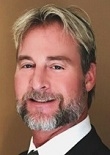
“You people need to remember something, Tom.”
“Yes?”
“Tell me, do you conduct patient satisfaction surveys?”
“We sure do.”
“Now remember, I have worked for a very long time. I am clued in.”
“Tell me more.”
“I bet the numbers look pretty good. Especially for your military program. True?”
At this point, I wondered what she was getting at, and replied:
“I believe a score on a good tool, conducted the correct way, of anything less than 99% in any category is not good enough. Only at that level have we truly done our job, honored our mission and created an environment for loyalty. That said, Linda, we have many scores into the mid-90s for our military program and, yes, they tend to be touted as quite positive.”
“So let me tell you something, Tom.”
Linda then inched up to the edge of her rocking chair and took both of my hands into hers.
“Military men like my Mike,” I now saw tears in Linda’s eyes as she struggled to continue, “These men (and women) are trained to be loyal … and you just said loyalty. These men and women are trained to be loyal. They are trained to overcome. They are trained to not complain. They are trained to follow orders. They are good men and women. And they are well-trained and honorable.”
Linda stopped and took a deep breath.
“Tom, your real scores could be in the 60s and they would be loyal. They could (and quite possibly are) being harmed and they would be loyal. Your mid-90s are a misnomer because they do not readily complain. No. They follow orders.”
She then sat back and took another deep breath.
“Tom. Don’t take advantage of their loyalty.”
The conversation detailed above took place long before the Hospital Consumer Assessment of Healthcare Providers and Systems (HCAHPS), and long before patient experience had become the latest focus. This was 2002, I was the chief operating officer for a military healthcare organization and we were conducting a Voice of the Customer to determine how we could better serve our military members and families and provide better access.
Linda was the wife of a military veteran (Mike), and she was sharing great wisdom with me and my team. She was also holding us accountable.
To this day, Linda’s words are etched in my mind and on my heart. “Don’t take advantage of their loyalty.”
As more focus has been placed on patient satisfaction and patient experience surveys such as HCAHPS, I am keenly aware that while we can learn much from numbers, we can learn so much more from our patients through the relationships we build with them, the stories they tell and the understanding we gain.
RELATED: Give greater weight to the ‘Impact Zone’ than HCAHPS scores
Through these relationships, we gain key nuggets of wisdom about improving how we care for and care about our patients. We learn how we can recognize and fan the flames of goodness in the system—for example, the nurse who sat and held the worried mother as her child was wheeled to surgery; the environmental services professional who identified a fall risk and ensured our patient was safe; the doctor who sat on the floor with the child too scared to engage.
And yes, we can identify those areas where we have failed. We can pinpoint where we can fix systems, coach peers, counsel others and move ever closer to high reliability.
And you know what?
When we create this ideal of relationship-centered care, the numbers—including HCAHPS scores—will move.
But even more importantly, we will be honoring those we serve. We will be honoring the loyal veterans who score us high regardless, and we will be honoring the new mother and baby, the scared father, the nervous caregiver, the parent or the grandparent. And we will be honoring one another.
In 2016, I joined Studer Group and have since coached and witnessed the impact of our Must Haves® in fostering these relationships.
My colleagues and I have witnessed the impact of AIDET Plus the Promise℠ as a nurse connects at both the heart and mind level with scared parents of a baby in the NICU. We watched how, through this connection, the parents were able to re-engage in the care of their child.
We have coached nurse leaders who have mastered achieving the essential quantitative aspects of Nurse Leader Rounding and who are now leveraging this tool to connect, engage and build trust and safety. Within this relationship-centered framework, they can elicit qualitative data that they are now sharing with their team, converting to information, and then translating to action as they continuously seek to improve care.
Relationships in healthcare are essential to optimal care. And relationship-centered care is vital to honoring all those we serve.
Thomas H. Dahlborg, M.S.H.S.M., is an industry voice for relationship-centered compassionate care and servant leadership. He is a keynote speaker, author, consultant and adviser and is the president of the Dahlborg Healthcare Leadership Group.